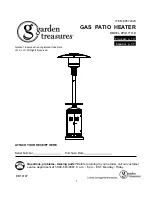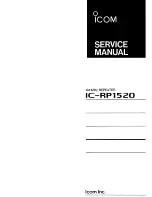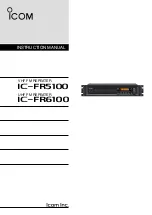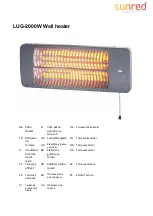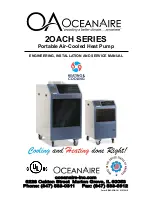
9801ST00AMEN
12
SECTION 7. COMMISSIONING, LIGHTING AND OPERATION
SPECIAL
NOTE
The following instructions have been written assuming
that the ST air heater is installed as a heating module
independent of being installed within an air handling
appliance. When installed within an air handling
appliance or as part of a multi-appliance/purpose system
it will be necessary to read any supplementary
instructions in conjunction with this document.
COMMISSIONING
1.
Final testing after production ensures that:
If
installation has been carried out strictly in
accordance with this document
, the appliance is
ready to be taken into service.
2.
Checks must be made to ensure;
-
earth
continuity
- resistance to earth
- phase supply to correct terminals
- current rating and fuse value
- correct supply gas pressure
- correct burner gas pressure
- satisfactory & smooth ignition
- Flue system is evacuating the products of
combustion to outdoor atmosphere
LIGHTING
1.
Ensure that air discharge louvres if fitted are set to
open.
2.
Turn on gas supply.
3.
Switch on electrical supply.
4.
Set time switch (if fitted) to an 'ON' cycle.
5.
Set room thermostat to 'ON' position.
6.
If reset button on heater and/or on remote control (if
fitted) glows, press reset button.
7.
Heater should now light automatically within 2
minutes. after a further period the air circulation fan
should run, (see also below: section 7.6.6).
8.
For a new installation or if the appliance has been
turned off for an extended period then up to 3 attempts
to light the air heater may be necessary. If the heater
still does not light, consult the fault finding guide
section 9.
OPERATION
(refer to figure 13)
1.
At the dictates of the external controls, an electrical
circuit is made and the combustion air fan ("venter")
runs.
2.
Provided adequate air flow is proved, the fan will
continue to run approximately 30 sec. (pre-purge
period).
3.
ST air heaters employ the direct burner ignition
principle. A hot surface igniter will glow for ± 15
seconds, after which time the gas valve(s) will open
and the burner will be lit.
4.
If the burner has not lit within 5 seconds, the electronic
flame relay will switch off and lockout will occur. This
will cause the signal lamp to glow within the reset
push-button on the appliance and/or on a remote
control if fitted). After 10 seconds the reset button on
the appliance or the remote control can be activated in
order to reset and restart the appliance.
5.
Flame failure protection is by the ionisation principle
i.e. the ability of a suitable flame to pass an electrical
current between the igniter and the earthed burner
assembly. To check the flame current is adequate,
remove jumper between terminal 17 and 18 on the
automatic burner control, connect a DC micro
ammeter between the terminals. Ionisation current
should be
≥
2
µ
A.
Note: The terminals carry mains voltage when
energised.
6.
Simultaneously to the ignition circuit and gas valve
circuit being energised, electrical power is supplied to
an anticipator within the air circulation thermal fan
control. If the air circulation fan control has been wired
via this thermal fan control then the air circulation fan
will start after about 2 minutes.
7.
In the event of the combustion air volume falling below
a safe level, the burner will be extinguished a re-start
cycle will commence after adequate combustion air
volume has
been
restored.
8.
If the burner flame is extinguished for any reason
during a run cycle, an automatic attempt for re-ignition
will take place, if the burner does not relight then
safety shut down and lockout will occur. Manual
intervention to reset is necessary to put the air heater
back into service.
9.
In the event of overheating for any reason, thermally
activated fail safe overheat controls operate to switch
off the burner.
The first control (LC1) switches off the burner and
upon its cooling, automatically resets and the lighting
sequence starts automatically.
The second control (LC3) which operates at a higher
temperature setting, will switch off the burner and itself
set to a lockout condition which also requires manual
intervention to reset to restore the heater to
operational condition. A cooling time of ± 1 minute is
necessary before thermal re-setting can be carried out
























